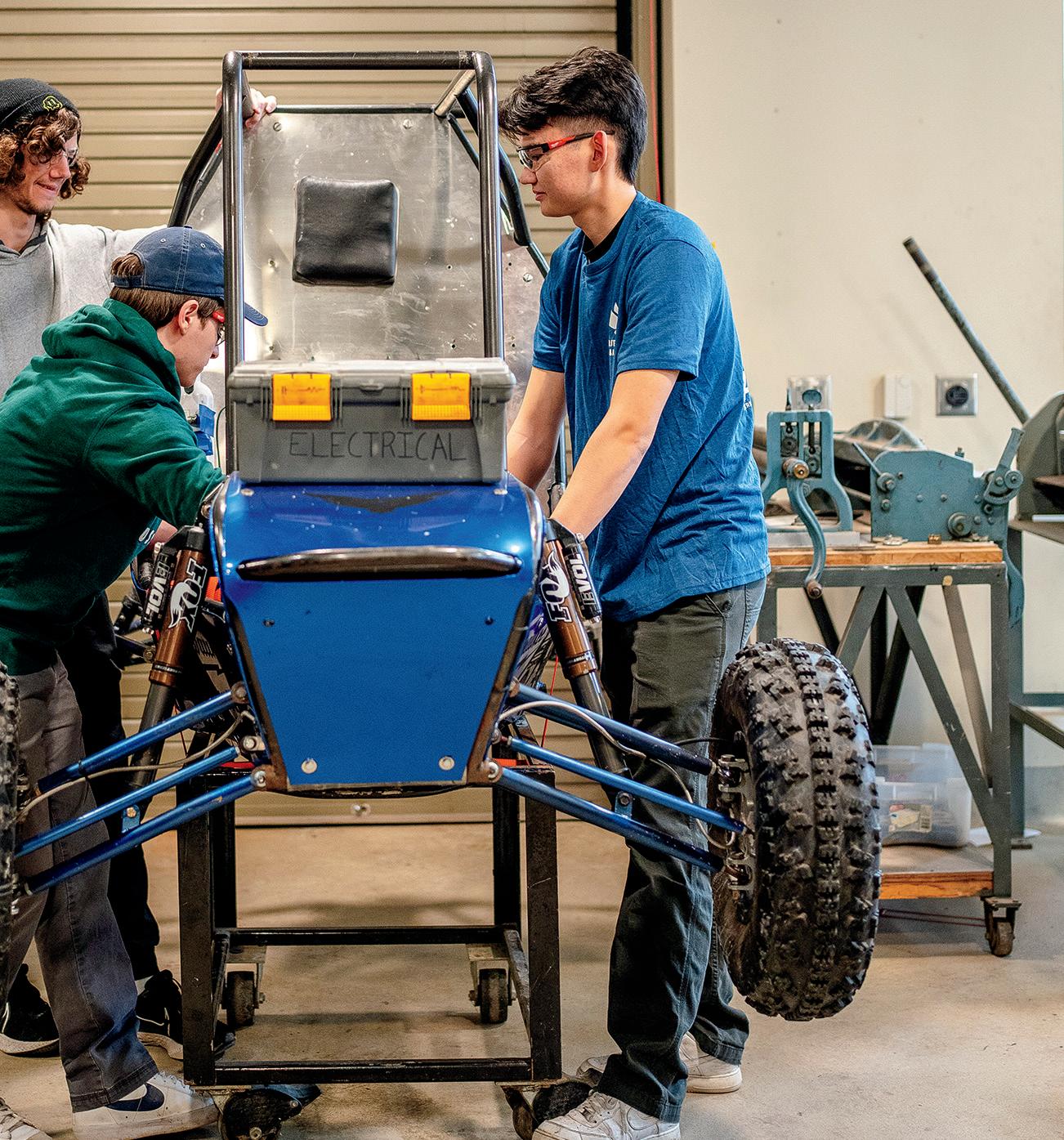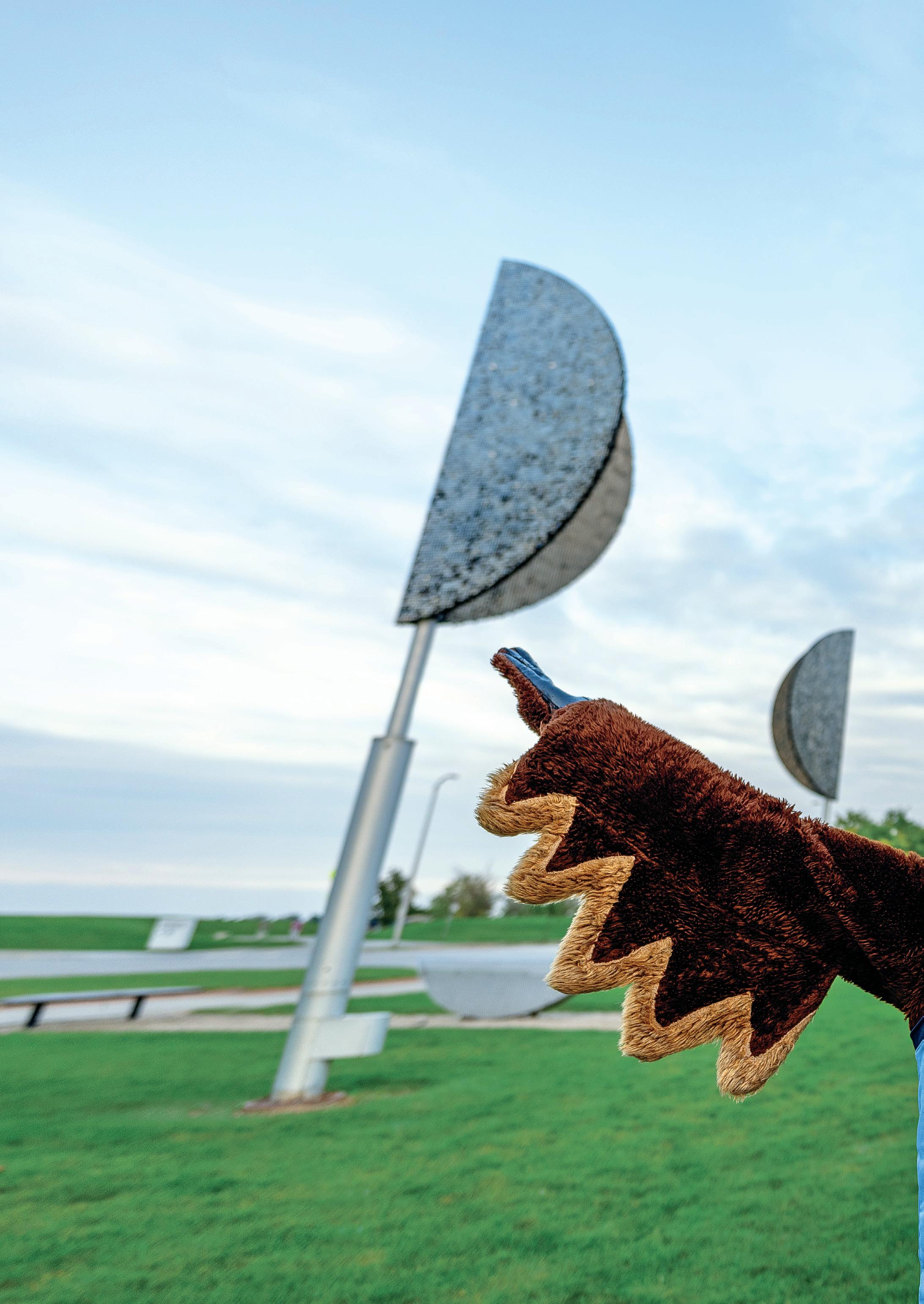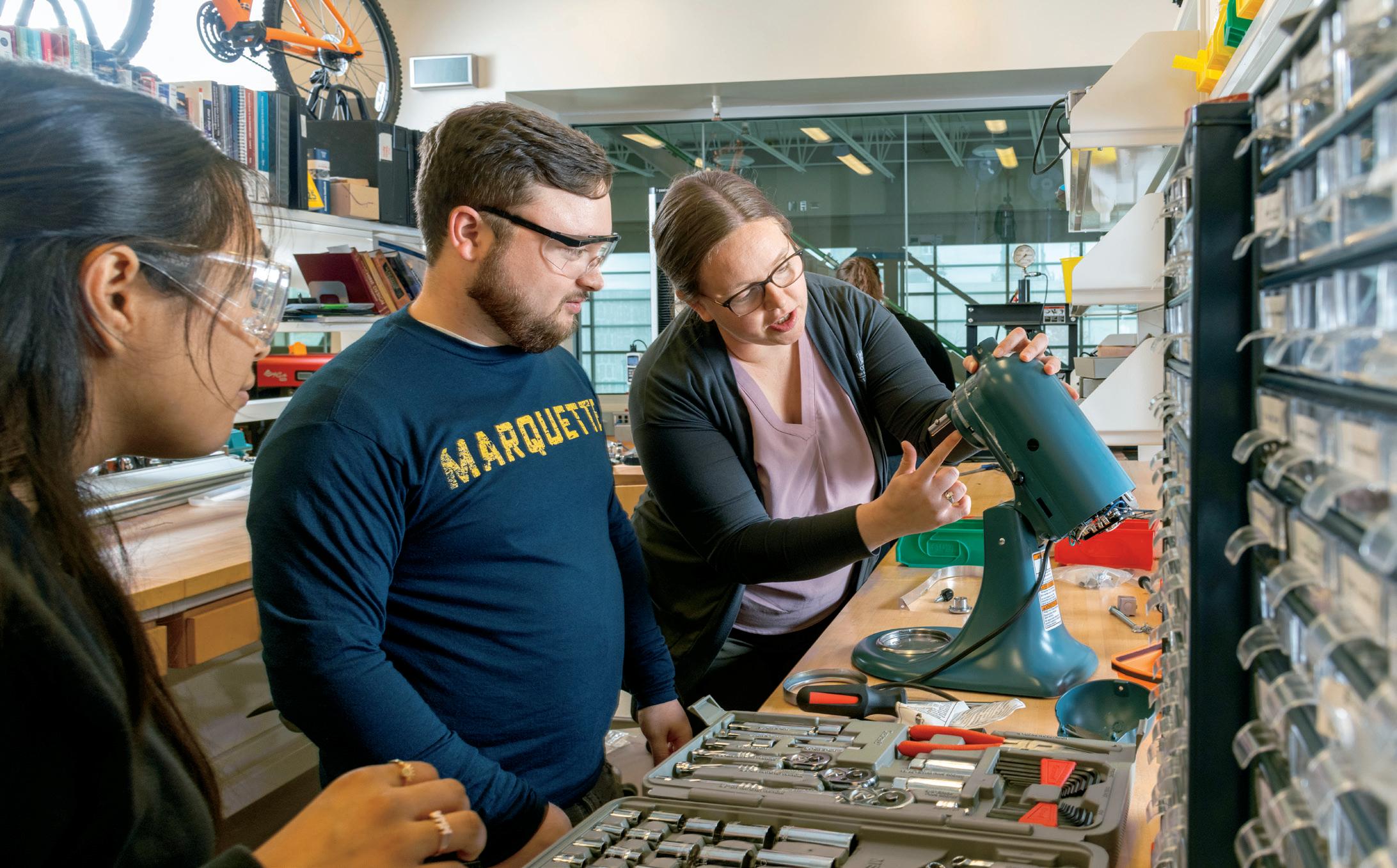
MARQUETTE UNIVERSITY
Opus College of Engineering





MARQUETTE UNIVERSITY
Opus College of Engineering






These are the fuels that ignite a spark. Sparks that turn into purposeful innovation — what we call solutions that serve the greater good. Here at Marquette, you’ll become a technically skilled engineer, for sure. Yet we’ll also challenge you to understand how you can be a part of something bigger: engineering a better world.

ENGINEERS develop life-changing solutions to medical and biological problems. They work at medical device companies, hospitals and research labs to design imaging systems, orthopaedic implants, coronary devices and much more. Marquette’s joint department unites our renowned engineering education and research with the Medical College of Wisconsin’s medical studies and clinical practice to offer you an extraordinary biomedical engineering foundation.
Biocomputing
Develop applications, software and computer systems that improve health care. For students interested in biomedical informatics, imaging, computational modeling, and metabolic and cellular engineering.
Bioelectronics
Create electrical/electronic system technologies and devices to understand, monitor and control biological processes. For students interested in biomedical imaging, optics, sensors, medical robotics and neurorehabilitation.
Biomechanics
Design devices and systems that solve problems related to the human body’s mechanics. For students interested in biomaterials, orthopaedic rehabilitation and tissue engineering.
Let’s DO this!
Customize ride-on play cars for Go Baby Go! to help children with special needs gain more independent mobility. Work alongside engineers, occupational therapists and community partners to adapt each car with patient-specific updates, such as oversized switches, lights for kids with vision problems and customized controls for parents. Expect to be moved by the drivers’ smiles as they take off in their new rides.


Engineering Student Council, E-Lead, Club Sailing, Kappa Delta sorority
“Having been diagnosed with Type 1 diabetes at age 2, I had never thought about who was designing the insulin pumps and meters I had used for years. But now I’m fueling a new purpose to aid those with chronic illnesses, confident my degree will allow me to innovate for people with similarly lived experiences and pursue my passion for humancentered design. My Marquette experiences — from sailing on Lake Michigan to leading my student council team to working on my senior design project — have shown me even the most difficult problems can be solved by stepping into the shoes of the person I’m helping.”
Civil engineering
Design, build and maintain structures and systems people need in their environment to thrive.
Environmental engineering
Apply engineering principles to address environmental challenges and design sustainable solutions.

Simon Mathiowetz
American Society of Civil Engineers, Concert Band, Pep Band
“As every tall building or skyscraper came into view on a car ride, I wondered how it stood. Now, as a civil engineering major, I have the chance to be on the teams that create the skyscrapers. In addition to being a part of the American Society of Civil Engineers, which has concrete canoe and steel bridge competitions, I also play flute in Marquette’s concert and pep bands. The band experiences allow me to collaborate and communicate with other students and build relationships outside the world of engineering. And the pep band gets to travel to other cities across the U.S. for basketball tournaments, allowing me more opportunity to still have that childlike wonder when I see high-rise buildings.”
Build a suspension pedestrian bridge or create a safe drinking water supply in Central America. These are examples of transformative, community-impacting projects you can lead as a team member of our Engineers Without Borders chapter. EWB allows you to change lives while getting some hands-on learning and activating the engineering skills you’ve learned in the classroom. And you get to visit another part of the world.



CIVIL ENGINEERS design our highways, bridges, skyscrapers, airports and more. Most typically work as civil, structural, transportation and construction engineers. ENVIRONMENTAL ENGINEERS design technologies and systems for wastewater treatment and disposal, water resource protection, air pollution control, and solid and hazardous waste management. They often work as consultants, or at government agencies, utilities and companies concerned with sustainable management of our natural resources.
For more than 100 years, MARQUETTE’S CO-OP PROGRAM has set up students with employment experience while they’re still in school. We match students with over 200 leading industry partners to offer you a head start on your career. Rotate between academic semesters and work terms after your sophomore year. Gain real-world skills, make professional connections, and get a firsthand feel for what your future job might be like. You get academic credit from us and a competitive salary from your co-op, which can help you pay for college. Expect your co-op experience to not just help you land a job — expect it to land you the job you want.
 Harley-Davidson
Harley-Davidson


Where engineering comes to life.
From our Visualization Lab to our Discovery Learning Lab and every lab in between, you’ll find many inviting learning spaces waiting for your exploration, creativity and innovation. And as an undergrad, you can team up with one of our faculty members to partner on important research going on in these labs.

“I’ve had the opportunity to intern at highprofile, locally based companies for the past five summers, four at Northwestern Mutual with a few different teams, and one at Rockwell Automation as a software engineering intern. All these experiences have provided me with a wealth of knowledge and exposure to several different technologies and tech stacks. While the classroom has provided me with the basic knowledge in some of these areas, the workplace utilizes them in different ways. It has been really cool to see how the work I have done directly impacts and benefits my teams, the organizations and the customers in such a positive manner.”


Let’s DO this!
Can you imagine developing an artificial intelligence system that limits electric grid outages so that air conditioning will continue to run on the hottest summer days? A team of computer engineering seniors recently designed this solution as their capstone project. Our senior capstone projects provide you with opportunities to strengthen valuable technical and team-building skills while challenging you to use those skills to create positive change.

COMPUTER ENGINEERS build computer systems, databases and networks. They design hardware and develop software, then combine them to create innovative solutions in areas such as artificial intelligence, processor and data center design, and cellular networks. They work in almost every industry, ranging from industrial automation, energy forecasting and medical devices to large social media, search engine and cloud service companies.

CONSTRUCTION ENGINEERS plan and design structures, roadways and bridges just as civil engineers do, but they then take the next steps of managing, budgeting and executing these plans to ensure a project is completed properly. Most construction engineers work for construction companies and government agencies.
Let’s DO this!
Construct a canoe out of concrete? Then race it 200 meters on the water? That’s the sink-or-swim assignment the Marquette Concrete Canoe Team takes on annually for the ASCE Great Lakes Regional Conference. Creativity is a must. Suspension of disbelief is helpful. Understanding the capabilities of concrete as a construction material is crucial. Canoes are judged on aesthetics, structure, quality of mixed concrete designs and racing performance.


Kenna Skaggs Society of Women Engineers, American Society of Civil Engineers, E-Lead, Engineering Student Ambassador
“I chose to major in construction engineering because as a young girl you never saw me playing with dolls; it was always Lego blocks! I would play with them for hours and loved how I could put everything together so smoothly and efficiently. Today, I am a part of the American Society of Civil Engineers (ASCE). My main interest with ASCE is the Steel Bridge Competition, where we design, create and build a bridge and compete against different colleges around the country. Seeing each part of the construction process while having fun with other students who have the same passion for doing hands-on activities inspires me to grow my mind and try new things.”

Cordell Williams
National Society of Black Engineers, E-Lead, Engineers Without Borders
“Through my classes I have worked in electronics labs, created circuits from scratch, and used simulation software to analyze the practical use of the small but mighty components that go into the devices I use daily. Outside of class, I got the chance to work with the Biomedical Engineering Society’s robotic arm project as an electrical team lead, designing, building and testing the circuitry and electrical components used to properly power the arm’s motors. I’ve also been able to develop my abilities as an engineer while also pursuing my interest in volunteer work by being a part of Engineers Without Borders’ Marquette chapter. I’ve helped design projects that have positively impacted various communities throughout Guatemala.”
Let’s DO this!
Design and build a robot prototype that can autonomously excavate lunar material on the moon. That’s the NASA-directed challenge dozens of university teams face each year at the Lunabotics Robotic Mining Competition held at the Kennedy Space Center. Recently, Marquette’s electrical engineering students, working with their interdisciplinary teams, have celebrated stellar success there innovating with sensors, motors and control systems that help the robot mine material and navigate around obstacles.




ELECTRICAL ENGINEERS design, develop and implement every device or system that uses electricity and power — solar panels, wind farms, microchips, medical devices, smart sensors and control systems for self-driving vehicles and smart buildings. They work across many industries including renewable energy, communications, health care, transportation, construction and manufacturing.

MECHANICAL ENGINEERS are focused on how and why machines work. They plan, design and direct the manufacturing, distribution and operation of a wide variety of robots, control systems and device designs for the automotive, aeronautics, traditional and additive manufacturing industries. The mechanical engineering field is very broad, and the profession provides diverse opportunities for interdisciplinary careers that touch nearly every aspect of life, such as systems engineers, mechanical designers, manufacturing engineers and technical writers.


This is rocket science: Marquette Rocketry, one of our 20-plus engineering student orgs, has launched to early success in just a few years. Compete statewide to build a rocket that can carry a payload, fly to a target altitude over 2,400 feet, eject the payload, and take a photo of its landing site when it reaches the ground. If that sounds too far out, simply enjoy learning the basics of rocket building, using rocketry simulation software, and launching cool rockets.


“I am the president for the Society of Hispanic Professional Engineers (SHPE), which is a great place for me to pursue mentorship. I would not be in the position I am today without the help of all my mentors. Our goal as SHPE MU is to create a familia where students feel supported, and they can lean on upper-level students for advice and tips to navigate studying a STEM degree. SHPE also allowed me to connect to my interest in aerospace by hosting various aerospace companies at the annual SHPE National Convention. I was able to land a summer internship with Boeing, a dream company of mine, because of my attendance at the national convention.”
Our central location just over a mile from Lake Michigan gives you the ideal home base to discover Milwaukee. World-class sports, concerts, festivals, restaurants, shopping, art and theatre are all within walking distance. And easy transportation options can take you anywhere in our city that your feet won’t.



Milwaukee boasts an extensive number of companies, organizations and firms in every industry, including several Fortune 500 headquarters, providing ample opportunities for internships, co-ops and future careers.
As a Marquette engineer, you will start engineering on day one. Our required courses have guaranteed availability, so most students graduate in eight academic semesters. Throughout your time here, you will be supported by caring mentors who have your best interests at heart.
Expert faculty teach 100% of our undergraduate courses, and we are consistently ranked nationally in the top 10% for undergraduate teaching.



Inspire as a leader
Become a people-centered leader guided by our Jesuit tradition. Join our E-Lead (Excellence in Leadership) program sophomore year, and you’ll complete a combination of leadership courses and experiences that prepare you to drive innovative solutions and reflect on the impact your work has on the world. Bonus: You’ll graduate with a concentration in engineering leadership, too.

1 Practice pays. Our centuryold co-op program allows you to alternate between academic semesters and work terms of full-time employment in an industry related to your major. Develop technically and professionally under an experienced mentor, and earn a competitive salary and credit toward your degree. Many co-ops turn into fulfilling full-time employment after college.
4 From the Society of Women Engineers to Engineers Without Borders, plus a wealth of groups, clubs and councils in between, Marquette offers you more than 20 engineering organizations in which you can serve, network and share ideas. And it’s easy to be involved and still manage your academics.

2
Rest assured that after graduation, you’re going to get where you want to go. Whether that means getting hired for the job you want or attending grad school to get an advanced degree, a Marquette education prepares you for a bright future. More than 93% of our graduates surveyed this year were employed, in graduate school or serving in the military six months after graduation.
3
5
If you’re talented, driven and ready to change the world, we’re here to help: 99% of Marquette undergrads receive financial aid. We have full-tuition scholarships for incoming engineering freshmen with outstanding academic achievement and significant financial need and partial-tuition scholarships, too. Check out our Scholarship Estimator.

We’ll support you from day one all the way through to graduation. Marquette engineers are connected to caring mentors who can answer questions and offer advice on a range of needs. This includes our faculty advisers in and outside of the classroom; staff advisers in our Academic Advising Center and Office of Industry Relations; employers looking to support young engineers through internships and co-ops; a dedicated engineering alumni network; and peer tutors and student organization leaders who can show you the ropes.
For more information or to
marquette.edu/engineering
MarquetteEngineering
marquette_opus_engineering
DeanRopellaMU
MUEngineering
Marquette University, in accordance with its Jesuit tradition and Guiding Values, is committed to fostering a diverse community of outstanding faculty, staff, and students, as well as ensuring equal educational opportunity, employment, and access to services, programs, and activities, without regard to an individual’s race, color, national origin, religion, age, disability, sex, gender identity/expression, sexual orientation, marital status, pregnancy, predisposing genetic characteristic, or military status. Employees, students, applicants or other members of the University community (including but not limited to vendors, visitors, and guests) may not be subjected to harassment that is prohibited by law, or treated adversely or retaliated against based upon a protected characteristic.
The University’s policy as well as federal and state laws and regulations prohibit unlawful discrimination and harassment. These laws include the Americans with Disabilities Act (ADA), Section 504 of the Rehabilitation Act of 1973, Title IX of the Education Amendments of 1972, and Title VII of the Civil Rights Act of 1964 as Amended by the Equal Employment Opportunity Act of 1972. These laws prohibit discrimination and harassment, including sexual harassment and sexual violence.
If you feel that you have been subjected to sexual harassment, discrimination or sexual misconduct, please contact Marquette University’s Title IX Coordinator: Alumni Memorial Union, Room 437, P.O. Box 1881, Milwaukee, WI 53201-1881, (414) 288-7206, or Office for Civil Rights: 230 S. Dearborn St., 37th Floor, Chicago, IL 60604, (312) 730-1560. To read the entire Marquette University Non-discrimination Statement, visit marquette.edu/nondiscrimination.